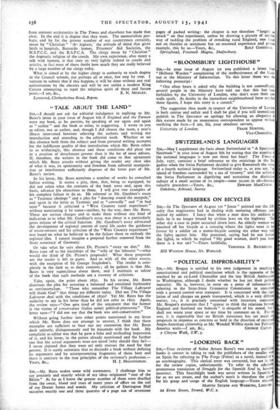- TALK AB DUT THE LAND "
SIR,—I should not ask for editorial indulgence in replying to Mr. Bates's letter in your issue of August 8th if England and the Farmer were my book, as he persists, by speaking of me again and again as " author " and the book as mine, in suggesting. I wrote to you as editor, not as author, and, though I did choose the team, a year's illness intervened between selecting the authors and writing my introduction and attending to the editorial work. Whether or no this absence both from the subject and from personal writing accounts for the indifferent quality of that introduction which Mr. Bates refers to so witheringly, this absence and these conditions did place me in a position of detachment greater than is the lot of most editors. If, therefore, the writers in the book did come to that agreement which Mr. Bates attacks without giving the reader any clear idea of what it was, its spontaneity and freedom from editorial manipula- tion or interference sufficiently disposes of the latter part of Mr. Bates's review.
In his letter, Mr. Bates mentions a number of works he consulted before writing. It seems a pity, then, that, being so equipped, he did not relate what the contents of the book were and, upon this basis, advance his objections to them. I will give two examples of his complete failure to do so. He referred to Mr. Gardiner's essay as " Teutonic ideology" and a plea for " dancing round the maypole," and again in the letter as Teutonic and as " cowardly " and " in bad taste " because it criticised a " West Country rural experiment " without mentioning it by name—neither, by the way, does Mr. Bates. These are serious charges and to make them without any kind of indication as to what Mr. Gardiner's essay was about is a particularly gross misuse of the critical function. Mr. Gardiner's essay advocated the development of regional centres of rural life under the guidance of estate-owners and his criticism of the " West Country experiment " was based on what he believed to be the failure there to embody the regional idea. I cannot imagine a proposal further removed from the State autocracy of Germany.
Or take what he says about Dr. Picton's " essay on diet." Mr. Bates runs off to the hardships of the " wife of the labourer "—what would she think of Dr. Picton's proposals? What these proposals are the reader is left to guess. And so with all the other essays, with the exception of Sir George Stapledon's. The reader is com- pletely in the dark as to their contents ; all he gathers is that Mr. Bates is very supercilious about them, and I maintain as editor of the book that such methods are a travesty of criticism.
Take, again, the point about 183o. In his review, Mr. Bates dismisses the plea for restoring a balanced and rotational husbandry as sentimentalism. "Those who remember The Village Labourer will thank God" that things are different today. Did not The Village Labourer deal with the conditions of 1830? Yet Mr. Bates has the audacity to say in his letter than he did not refer to 183o. Again, the review says—" One gets tired of the argument that the farmer is the victim of conservative (italics mine) political-plutocrats!' The letter says--" J did not say that the•book was anti-conservative."
Without going further into other points mentioned in my letter which Mr. Bates does not attempt to answer, I think that these examples are sufficient to bear out my contention that Mr. Bates dealt unjustly, disingenuously and by innuendo with the book. My complaint as editor was that he gave a false and misreading impression of it, and his letter, in the points already mentioned and the further one that the actual arguments were not novel (why should they be?— I never claimed that they were so) only stresses the need for that protest. It is surely axiomatic that to discredit a book without defining its arguments and by misrepresenting fragments of them here and there is contrary to the true principles of the reviewer's profession.—


























 Previous page
Previous page